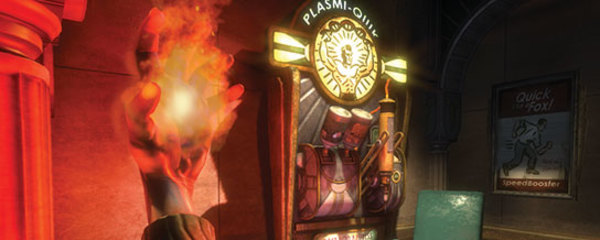Bioshock: Season-Ending Shocker
We chat with Ken Levine, Creative Director of 2K Boston and the mind behind one […]
Bioshock: Season-Ending Shocker
We chat with Ken Levine, Creative Director of 2K Boston and the mind behind one […]

We chat with Ken Levine, Creative Director of 2K Boston and the mind behind one of 2007’s greatest videogame successes, BioShock.
XLR8R: How and when was BioShock born?
Ken Levine: I’d say we’ve been thinking about it since around 2000, but the ball really got rolling in 2004. It went through a lot of iterations, but we really settled into the BioShock we know now in late 2005.
Did you think BioShock would become as huge as it was?
I think the team and I were pretty surprised. I’ve done this long enough to know that it’s almost impossible to tell if other people will love the thing you love. I’ve made enough games that didn’t do well that I stopped trying to guess. We never set out to make a game that doesn’t sell well; we set out to make exactly the game we wanted to make and we’re thrilled that people seem to dig it.
Did anything specific influence you for BioShock?
It was a day that my wife and I spent at Rockefeller Center in New York that sealed the deal on the visuals of the game. I had been there a thousand times but it never occurred to me that it would work visually in a game before. As far as other influences, The Shining is the novel that taught me what scary was. Also, certainly Fight Club, The Hudsucker Proxy, and Logan’s Run for movies. And of course, riding over it all was [Ayn] Rand’s The Fountainhead.
What are your personal gaming habits? Any favorites?
I play a bit of everything–Jeanne D’Arc on the PSP, Halo 3, and I finished most of the new Zelda on DS, too. I’m looking forward to Hellgate and I think I’ll never stop playing Civilization as they keep making them.
The music in BioShock contributed largely to the game’s mood. Do you think that the role of music in games has reached a level it deserves?
I wasn’t a fan of music in games until BioShock. I never wanted music in our games, I thought it got in the way. It wasn’t until Emily Ridgway showed me what she and composer Garry Schyman could do with his beautiful score that I believed in it. Now I can’t imagine BioShock without it. Selecting the licensed score to BioShock was also a great joy for me. I got to connect with my dad, who pointed me in the right direction (he was a young man during the period). And I got to know artists like Django Reinhardt and Bing Crosby. (Moby and Oscar the Punk also remixed several tracks for a BioShock EP–Ed.)
Are you pleased with the state of gaming?
I’m pretty happy with the state of things. Downloadable content really rounded out games for me. I was worried niche products would disappear, but the internet lowered the barrier of entry. The handhelds are now powerful [enough] to support real gaming, so there’s always an option no matter where you are.
We’d say you’ve had a hell of year. How do you feel about it now that BioShock is out?
I’m glad it’s over, but I really miss working on it. The experience of building the game with the team was without a doubt the highlight of my career.

